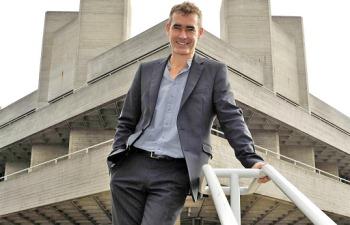The Future of the National Theatre - 2016
The National Theatre is by far one of the UK's greatest institutions, and is arguably one of the world's greatest theatrical buildings. Despite a long and rocky road to its creation, especially in comparison to the European models, it continues to produce high quality theatre that appeals to a huge cross section of society. At a time of funding uncertainly in the arts, it's fair to say that public subsidised arts organisations are feeling the pinch. The National Theatre had to face up to the fact that it has lost 30% of its government funding since 2010, and thanks to the strong work of Nick Starr and the previous Artistic Director Nicholas Hytner, the venue began to build reserves in order to keep the figures in the black and allow it to continue to produce work of world-class quality.
Rufus Norris may have taken over the reigns at a slightly rocky period in the National's history, but attendance continues to be up, with shows across all four venues playing to 89% capacity - a figure that is highly commendable considering the wider competition in the commercial theatre sector. The annual press conference is an opportunity for the Artistic Director to outline the venue's vision for the upcoming year, not only announcing the highly anticipated productions and casting news that theatregoers are waiting for, but also address wider issues within the industry as a whole.
With a title that demands national representation, questions about diversity were hot on the list of topics addressed by the press. Starting with the news that Sir Lenny Henry has joined the board, Norris said he was delighted to have a "front row" artist back on the board, commending Henry as "an incredible active figure in terms of diversity which is one of the main parts of the work we want to move forward in the next five years. He's a great ambassador for theatre and the arts, we're lucky to have him."
When asked if he was happy about where the venue currently was in terms of diversity, especially in relation to BAME audiences, Norris answered "no". He admitted that there are areas in which the venue has to do better, but congratulated their efforts representing BAME actors on stage, saying the current figure for the past year is 30%, and that that represents a "healthy place". He went on to say that as an organisation they are working on "swathes of initiatives", especially looking at bringing in more writers and directors, saying the venue "has to feel like an industry that's open to a proper cross section of the nation".
With the announcement of two gender-reversed roles in the upcoming season, that of Tamsin Greig who will star as 'Malvolia' in Shakespeare's Twelfth Night, and a yet-to-be cast female in the role of 'Captain Hook', which is apparently in line with the original intentions of Peter Pan author J.M Barrie, Norris stated that "gender balance across the whole organisation is massively important." This extends not just in casting decisions, but into writers and directors, and they have set a target and a hope that by 2021 they will be at a stage where they have a 50/50 gender balance in living writers represented. He commented that "this is a good time - there are a lot of talented women playwrights at the moment and women directors coming through it's our responsibility to nurture that and reap the benefits."
As ever, one of the biggest areas of concern is funding. With the venue set to loose a substantial part of its revenue when War Horse closes at the New London Theatre next month, there is a sense of 'contracting' the organisation in an effort to make it "the most efficient version of ourself." When asked if these choices had any implication on the programming, he was quick to respond that the board makes "decisions to make sure the impact to audiences is non existent". Reigning in costs across the organisation and tightening its belt has meant that they will no longer offer Sunday performances, saying they are the least popular and last to sell, and also difficult in terms of cross casting and "getting the most value for money out of the actors you're working with." The building will be kept open on Sundays however, as the Southbank has become a vital part of London's landscape especially during the summer months.
Looking at the titles announced over the coming season, there was thought that the programming lacked the 'edginess' of last season's announcement, with popular titles and 'stars' possibly being used to fill seats. "You've got to see this programme in combination with the shows that have already been announced", Norris responded, "With these popular titles, the fact that they're popular means that we can afford to re-imagine them in ways that will hopefully revitalise them and bring them to a new audience."
In reference to the National presenting Amadeus and Angels in America, two productions it originally premièred, Norris declared "I was at drama school when I saw Angels in America and I'm a very old man. There are a lot of people who have never seen that show - Amadeus has only been done a couple of times in London since the original production here. With all the classics I hope we're bringing new impressions to it. Yes, there are classics in there and that's always going to be the spine of what we do - we hope we're bringing an energy and a vitality to all of them that will keep the edginess. I think there will be enough edge to keep everyone happy".
Buy Tickets for National Theatre productions at the National and in the West End here.
Originally published on
